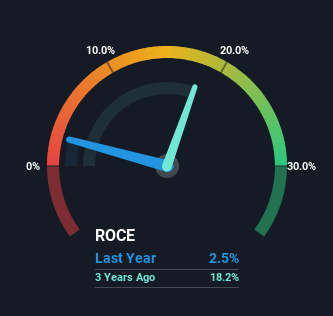- Hong Kong
- /
- Oil and Gas
- /
- SEHK:9689
There Are Reasons To Feel Uneasy About JTF International Holdings' (HKG:9689) Returns On Capital

Did you know there are some financial metrics that can provide clues of a potential multi-bagger? Firstly, we'll want to see a proven return on capital employed (ROCE) that is increasing, and secondly, an expanding base of capital employed. Basically this means that a company has profitable initiatives that it can continue to reinvest in, which is a trait of a compounding machine. However, after briefly looking over the numbers, we don't think JTF International Holdings (HKG:9689) has the makings of a multi-bagger going forward, but let's have a look at why that may be.
Understanding Return On Capital Employed (ROCE)
For those that aren't sure what ROCE is, it measures the amount of pre-tax profits a company can generate from the capital employed in its business. The formula for this calculation on JTF International Holdings is:
Return on Capital Employed = Earnings Before Interest and Tax (EBIT) ÷ (Total Assets - Current Liabilities)
0.025 = CN¥11m ÷ (CN¥522m - CN¥68m) (Based on the trailing twelve months to June 2024).
Therefore, JTF International Holdings has an ROCE of 2.5%. In absolute terms, that's a low return and it also under-performs the Oil and Gas industry average of 6.9%.
View our latest analysis for JTF International Holdings

Historical performance is a great place to start when researching a stock so above you can see the gauge for JTF International Holdings' ROCE against it's prior returns. If you'd like to look at how JTF International Holdings has performed in the past in other metrics, you can view this free graph of JTF International Holdings' past earnings, revenue and cash flow.
So How Is JTF International Holdings' ROCE Trending?
In terms of JTF International Holdings' historical ROCE movements, the trend isn't fantastic. To be more specific, ROCE has fallen from 16% over the last five years. And considering revenue has dropped while employing more capital, we'd be cautious. This could mean that the business is losing its competitive advantage or market share, because while more money is being put into ventures, it's actually producing a lower return - "less bang for their buck" per se.
The Bottom Line
From the above analysis, we find it rather worrisome that returns on capital and sales for JTF International Holdings have fallen, meanwhile the business is employing more capital than it was five years ago. Long term shareholders who've owned the stock over the last five years have experienced a 13% depreciation in their investment, so it appears the market might not like these trends either. That being the case, unless the underlying trends revert to a more positive trajectory, we'd consider looking elsewhere.
If you want to know some of the risks facing JTF International Holdings we've found 3 warning signs (1 is concerning!) that you should be aware of before investing here.
For those who like to invest in solid companies, check out this free list of companies with solid balance sheets and high returns on equity.
New: Manage All Your Stock Portfolios in One Place
We've created the ultimate portfolio companion for stock investors, and it's free.
• Connect an unlimited number of Portfolios and see your total in one currency
• Be alerted to new Warning Signs or Risks via email or mobile
• Track the Fair Value of your stocks
Have feedback on this article? Concerned about the content? Get in touch with us directly. Alternatively, email editorial-team (at) simplywallst.com.
This article by Simply Wall St is general in nature. We provide commentary based on historical data and analyst forecasts only using an unbiased methodology and our articles are not intended to be financial advice. It does not constitute a recommendation to buy or sell any stock, and does not take account of your objectives, or your financial situation. We aim to bring you long-term focused analysis driven by fundamental data. Note that our analysis may not factor in the latest price-sensitive company announcements or qualitative material. Simply Wall St has no position in any stocks mentioned.
About SEHK:9689
JTF International Holdings
An investment holding company, engages in the blending and selling of fuel oil in the People’s Republic of China.
Flawless balance sheet low.
Similar Companies
Market Insights
Community Narratives




